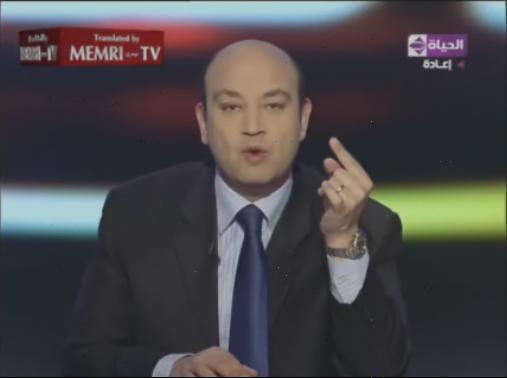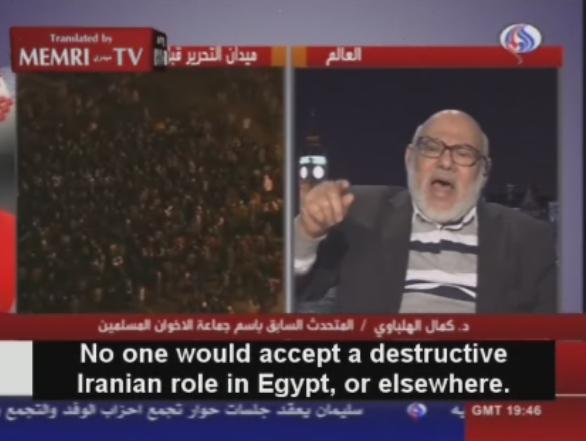The following is research published today from MEMRI’s Special Dispatch Series and the MEMRI TV Project. Inquiry & Analysis No. 664—Iran/Egypt/Inter-Arab Relations By: A. Savyon and Y. Mansharof* On the eve of celebrations marking the anniversary of the Islamic Revolution in Iran (February 1-11), regime heads and spokesmen praised the popular uprisings in Egypt and Tunisia, and claimed that they were both inspired by and constitute a direct continuation of the 1979 Islamic Revolution in Iran. According to them, such popular Islamic revolutions are destined to take place in the near future across the Arab world, reflecting the emergence of Islamic rule in the region in the face of the defeat of the West, led by the U.S., and of Israel. Along with declarations celebrating Islam's victory over the American idolatry, the regime made great efforts, with a public display of force, to preempt any possible attempts at protests on the occasion. It was reported, inter alia, that there was a significant increase in executions of citizens (including one woman, an Iranian with Dutch citizenship) who had been detained since the 2009 protests against President Mahmoud Ahmadinejad's government, along with increased oversight of anti-regime activity online. In contrast, Mehdi Karroubi and Mir Hossein Mousavi, the leaders of the Green Movement (i.e., the protest movement), took an opposite view of the current Middle East events, implying that the Tunisian and Egyptian uprisings would have ramifications for Iranian civil society. They claimed that the popular protests were anti-dictatorship, whether secular or Islamic, and that the fate of the dictatorial Iranian regime would be the same as the Tunisian and Egyptian regimes. The protest movement leaders sought approval from the regime to hold a February 14 march in support of the popular uprisings in Tunisia and Egypt. Also, Mousavi's website, Kaleme, published an article calling on the protest movement to organize, and to include representation from various sectors of society – in order to successfully act against the regime, in imitation of the successful Tunisian uprising. To read the full report, visit http://www.memri.org/report/en/0/0/0/0/0/0/4988.htm. Special Dispatch No. 3573—Egypt/Iran/Inter-Arab Relations Following are excerpts from a statement by Egyptian TV host Amr Adib, which aired on Al-Hayat TV (Egypt) on February 7, 2011. To view this clip, visit http://www.memritv.org/clip/en/2799.htm Amr Adib: "That man of Iran [Khamenei] never speaks a word of Arabic. He would sit with the Arab leaders everywhere, and would refuse to speak with them in Arabic. He would speak in Farsi. All of a sudden, last Friday, when he wanted to address the Egyptian people, he spoke in Arabic. After always talking in Farsi – 'Sha shi shi sha she' – he started speaking Arabic all of a sudden." To read the full report, visit http://www.memri.org/report/en/0/0/0/0/0/0/4989.htm. Special Dispatch No. 3574—Egypt/Muslim Brotherhood/Inter-Arab Relations Following are excerpts from an interview with Kamal Al-Hilbawi, former speaker of the Egyptian Muslim Brotherhood, which aired on Al-Alam TV (Iran) on February 7, 2011: To view this clip, visit http://www.memritv.org/clip/en/2797.htm. Kamal Al-Hilbawi: "The only foreign intervention in this revolution is that of Israel. They destroyed the gas pipeline, so that the revolutionaries would be accused of using explosives." To read the full report, visit http://www.memri.org/report/en/0/0/0/0/0/0/4990.htm. Special Dispatch No. 3575—Iran/Inter-Arab Relations Iranian President Mahmoud Ahmadinejad's foreign policy poses a challenge not only for the Arab and Western countries, but also taxes Iranian circles traditionally loyal to the regime. Criticism in the Iranian press is usually aimed at the moderate Arab axis – Egypt, Saudi Arabia, and Jordan (see appendix) – but after recently taking steps towards reconciliation with these countries, Ahmadinejad himself has met with criticism at home. In a December 20, 2010 article titled "The Diplomatic Mirage of Amman, Riyadh, Cairo, and Sana'a," the Iranian daily Kayhan, which is close to Iranian Supreme Leader 'Ali Khamenei, not only criticized these countries' regimes but also attacked Ahmadinejad's foreign initiatives aimed at rapprochement with them. The criticism came in response to a number of recent developments, including a meeting held in Amman between King 'Abdallah of Jordan and Ahmadinejad's advisor Sfandiar Rahim Mashai, and an invitation of the former to visit Iran; statements made by Iran's newly appointed caretaker foreign minister 'Ali-Akbar Salehi, in his swearing-in ceremony, which emphasized the importance of developing special ties with Saudi Arabia in light of its prominent religious and economic status; and reports in the media of improving economic ties between Iran and Egypt. Kayhan claimed that Ahmadinejad's gestures of friendship towards the moderate Arab states contradicted the regime's official policy, which was determined by officials senior to Ahmadinejad, most notably Khamenei. The daily also lambasted Jordan and Saudi Arabia, which it accused of encouraging terrorism against Iran and its citizens. It claimed that Jordan was host to a widespread terror network responsible for attacks throughout the region, and that Saudi Arabia funded and directed terrorist activity against Iran and the Shi'ites. It also attacked Yemen for its campaign against Islamist organizations, waged with U.S. and Saudi cooperation, and for its oppression of the Shi'ite Houthis. Kayhan said that Ahmadinejad's initiatives vis-à-vis the moderate, Western-allied Arab states looked like capitulation on the part of Tehran to the terrorism perpetrated by these countries. To read the full report, visit http://www.memri.org/report/en/0/0/0/0/0/0/4991.htm. Special Dispatch No. 3576—Saudi Arabia/Iran/Inter-Arab Relations Two prominent views are being expressed in Iran regarding the future of the Middle East in the wake of the uprisings in Tunisia and Egypt. Circles close to Iranian Supreme Leader Ali Khamenei and Iranian President Mahmoud Ahmadinejad predict that similar uprisings will take place in Saudi Arabia, Jordan, Algeria, and Morocco, leading to the establishment of Islamic regimes there that will join the camp led by Iran. Other conservative circles call on the Saudi regime to adopt Iran's stance, and join it in leading the region's struggle against the West and Israel. To read the full report, visit http://www.memri.org/report/en/0/0/0/0/0/0/4992.htm.MEMRI Daily –
Egypt's Crisis and Iran: February 11, 2011
In Advance of Iran's Revolution Day, Iranian Regime Circles, Protest Movement Comment On Egypt's Uprising in the Mirror of the Iranian Revolution
Egypt Uprising: Egyptian TV Host Amr Adib Mocks Iranian Leader Khamenei for Interfering in Egypt's Internal Affairs

Kamal Al-Hilbawi, Former Speaker of the Egyptian Muslim Brotherhood, Calls upon Egypt, Saudi Arabia, and Tunisia to Take an Example from Iran

Iranian Daily Kayhan: Ahmadinejad's Rapprochement with Moderate Arab States is 'Capitulation'
Two Views in Iran on Saudi Arabia's Course of Action in Wake of Uprisings in Tunisia, Egypt
Friday, 11 February 2011
Posted by
Britannia Radio
at
18:10
![]()





















